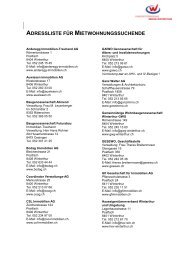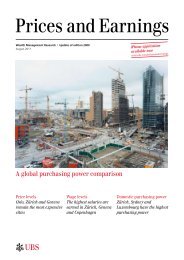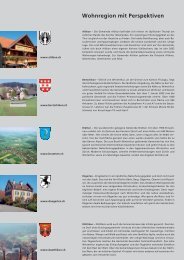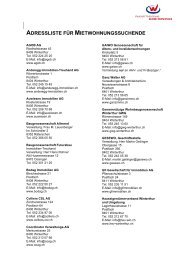Handbook for Investors. Business location in Switzerland.
Handbook for Investors. Business location in Switzerland.
Handbook for Investors. Business location in Switzerland.
You also want an ePaper? Increase the reach of your titles
YUMPU automatically turns print PDFs into web optimized ePapers that Google loves.
Swiss securities dealers are def<strong>in</strong>ed as any persons professionally<br />
engaged <strong>in</strong> buy<strong>in</strong>g or sell<strong>in</strong>g securities <strong>for</strong> their own account<br />
or <strong>for</strong> another person, <strong>in</strong>clud<strong>in</strong>g Swiss banks and other Swiss<br />
bank-like <strong>in</strong>stitutions. Furthermore, companies hold<strong>in</strong>g taxable<br />
securities whose book values exceed CHF 10 million and remote<br />
members of a Swiss stock exchange with regard to Swiss titles<br />
which are quoted on the Swiss stock exchange are considered<br />
Swiss securities dealers.<br />
10.6.2 Real estate taxes<br />
Capital ga<strong>in</strong>s on Swiss immovable property are either subject to<br />
a special cantonal real estate ga<strong>in</strong>s tax or to ord<strong>in</strong>ary corporate<br />
<strong>in</strong>come tax depend<strong>in</strong>g on the system that is applied <strong>in</strong> the canton<br />
where the immovable property is located. The right to tax such<br />
ga<strong>in</strong>s is reserved to the cantons and municipalities.<br />
Furthermore, <strong>in</strong> most cantons the transfer of real estate is subject<br />
to a conveyance tax, whereas on the federal level no taxes of<br />
such k<strong>in</strong>d are levied. As a general rule, conveyance tax is assessed<br />
on the purchase price or the taxable value of the real<br />
estate and is typically paid by the purchaser of the real estate.<br />
Depend<strong>in</strong>g on the canton, the applicable tax rate varies between<br />
1 % and 3 %.<br />
10.7 Double taxation treaty<br />
network.<br />
To m<strong>in</strong>imize the effect of double taxation <strong>in</strong> <strong>Switzerland</strong> and<br />
abroad, <strong>Switzerland</strong> has concluded tax treaties cover<strong>in</strong>g direct <strong>in</strong>come<br />
taxes with all important <strong>in</strong>dustrial countries and many other<br />
countries. Most of these treaties are patterned on the pr<strong>in</strong>ciples<br />
of the OECD model convention, which def<strong>in</strong>es where the <strong>in</strong>come<br />
or the assets are to be taxed and also describes the method<br />
<strong>for</strong> the elim<strong>in</strong>ation of double taxation. <strong>Switzerland</strong> adopted the<br />
tax exemption method, exempt<strong>in</strong>g <strong>in</strong>come allocable to a <strong>for</strong>eign<br />
country from taxation <strong>in</strong> <strong>Switzerland</strong>. Such <strong>in</strong>come and net worth<br />
is only considered <strong>for</strong> calculat<strong>in</strong>g the applicable tax rate (progression).<br />
On certa<strong>in</strong> <strong>in</strong>come streams (dividend, <strong>in</strong>terest and license<br />
fees) both states, the state <strong>in</strong> which the <strong>in</strong>come is earned and<br />
the state of the recipient’s residence, are entitled to tax them.<br />
However, the double tax treaty limits the right of taxation of the<br />
source state, and the source tax can be credited aga<strong>in</strong>st the tax<br />
levied <strong>in</strong> the recipient’s state of residence. To date, more than 70<br />
tax treaties are <strong>in</strong> effect, plus also the EU bilateral agreements<br />
(s<strong>in</strong>ce July 1, 2005). As Swiss tax treaties are treated as <strong>in</strong>ternational<br />
conventions, they generally supersede federal as well as<br />
cantonal/municipal tax rules.<br />
Moreover, about half of the cantons levy a special wealth tax on<br />
real estate. This tax is due every year <strong>in</strong> addition to the general<br />
wealth tax. The tax is levied at the place where the property is<br />
situated and is assessed on the market or taxable value of the<br />
real estate without allow<strong>in</strong>g <strong>for</strong> deduction of debts. The tax rates<br />
applied range between 0.03 % and 0.3 %.<br />
Swiss double tax treaties apply to persons (<strong>in</strong>dividuals or companies)<br />
who are resident <strong>in</strong> one or both of the contract<strong>in</strong>g states.<br />
As already mentioned <strong>in</strong> section 10.3.5, Swiss residents apply<strong>in</strong>g<br />
<strong>for</strong> lump-sum taxation generally qualify <strong>for</strong> treaty relief as well.<br />
However, some treaties provide <strong>for</strong> special conditions to be met<br />
<strong>in</strong> order to benefit from the treaty applied.<br />
Apart from the tax treaties cover<strong>in</strong>g direct <strong>in</strong>come taxes, <strong>Switzerland</strong><br />
also concluded a few tax treaties <strong>in</strong> the area of <strong>in</strong>heritance<br />
and estate tax. <strong>Switzerland</strong> has not negotiated any double tax<br />
treaties concern<strong>in</strong>g gift taxes so far. Furthermore, there are some<br />
special treaties relat<strong>in</strong>g to cross-border commuters, taxation of<br />
<strong>in</strong>ternational air and transport, and the tax situation of <strong>in</strong>ternational<br />
organizations and their staff.<br />
100 <strong>Handbook</strong> <strong>for</strong> <strong>Investors</strong> 2010









